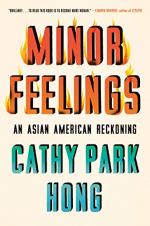|
This section contains 807 words (approx. 3 pages at 400 words per page) |

|
Minor Feelings Summary & Study Guide Description
Minor Feelings Summary & Study Guide includes comprehensive information and analysis to help you understand the book. This study guide contains the following sections:
This detailed literature summary also contains Topics for Discussion on Minor Feelings by Cathy Park Hong.
The following version of this book was used to create the guide: Hong, Cathy Park. Minor Feelings: An Asian American Reckoning. Penguin Random House LLC, 2020.
Cathy Park Hong's Minor Feelings: An Asian American Reckoning is a collection of seven essays, each written in a modular form. This structure works through the collaged accumulation of Hong's personal anecdotes, references to ancillary texts, and historical accounts. The essays do not follow a linear or neat progression of exploration, functioning, rather through paratactic association.
In "United," Hong holds that American culture seeks to disappear Asian citizens. Throughout the essay, Hong references her own childhood, as well as a range of news stories, in order to support her claim. She begins by explaining her history of depression, and the ways in which her mental state often made her hate herself. In retrospect, she realizes that her self-hatred was also a symptom of her racial identity. Because majority United States culture demanded that Hong and her family be quiet, compliant, academic, and hardworking, Hong desired invisibility. She references her familial history, her parents' and grandmother's immigration to the States, and their struggles to assimilate and establish stability. Despite these efforts, Hong always felt excluded and isolated. Through Dao's story, she particularly understands that if Asian Americans step outside prescribed models of behavior, they will be violently targeted and abused.
In "Stand Up," Hong explores the ways in which studying comedian Richard Pryor's work allowed her to reevaluate and reinvent her own racial and artistic identity. In Pryor's stand up, Hong witnessed an authenticity and boldness she had been unable to embrace in her own writing. Unlike Pryor, she feared her majority white audience. She felt entrapped by the ways in which she was expected to narrate and express her lived experience, the truth of her voice. Hong then attempted employing humor at the start of her readings in order to acknowledge her insecurities before the audience could.
In "The End of White Innocence," Hong uses literary notions of the loss of innocence in order to discuss the concept of white innocence, and white tears. Hong argues that minority individuals do not experience the same literary narrative arcs that majority white individuals do. Whereas Hong was forced to read and understand the adolescent coming of age stories of white youth, her white classmates were never asked to read or understand her minority reality. Once Hong began reading writers of color, she felt seen and validated. She now works to subvert notions of white innocence in her own writing.
In "Bad English," Hong describes her fraught relationship with the English language. As a child, Hong was embarrassed by her family's poor use of the language. She wanted to escape the obvious nature of Korean American identity. While in college at Oberlin, Hong studied poetry under Myung Mi Kim. Kim's assigned readings and lectures helped Hong see the ways in which language and writing could be political. By employing the broken English of her youth, Hong might be able to enact her particular feelings of oppression and exclusion.
In "An Education," Hong resists writing about her mother, as is expected of all Korean American narratives, writing instead about her close friendships with Asian American women. While attending college at Oberlin, Hong reconnected with her childhood art camp friend, Erin. Through Erin, she met Helen, and the three established a close friendship. Erin and Helen's bold and unabashed spirits both in and out of the classroom, inspired and encouraged Hong. She not only felt seen and validated by her friendships, but found that these connections demanded an artistic energy she had not known before. When Hong grew frustrated with her visual art, she began studying poetry. Her poetic explorations fueled her writing career.
In "Portrait of an Artist," Hong writes the story of Theresa Hak Kyung Cha's life and death. Cha's work, particularly her autobiographical text, Dictee, were particularly revolutionary to Hong during college. Years after graduating, while reviewing Cha's work, Hong was disturbed to discover the lack of information regarding her brutal rape and murder. Feeling she could not write truthfully about Cha's work without knowing the details of her story, Hong began researching. Hong's interviews and studies made her see that the lack of coverage on Cha's death was immediately linked to her racial identity. The essay works to make Cha's life and work visible once again.
In "The Indebted," Hong discusses the difference between indebtedness and gratitude. In order to better understand her racial identity and history in America, Hong researches Asian American activism. She realizes how much she owes all those who struggled before her in order to give her the life she has now. However, learning even more about American racial atrocities, makes Hong resistant to thanking a nation that actively has sought to disappear her people for centuries.
Read more from the Study Guide
|
This section contains 807 words (approx. 3 pages at 400 words per page) |

|



